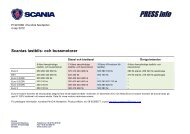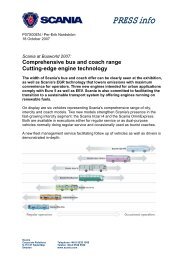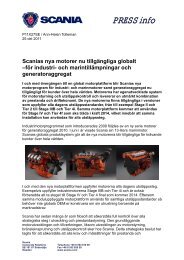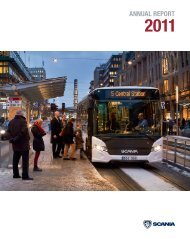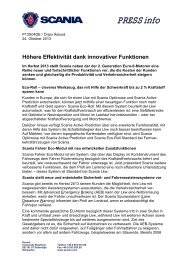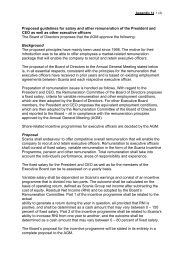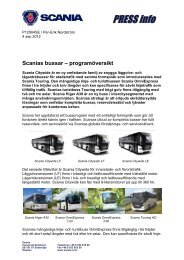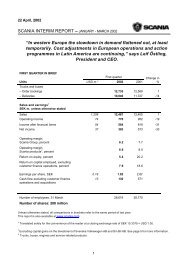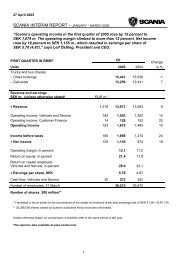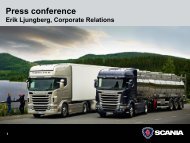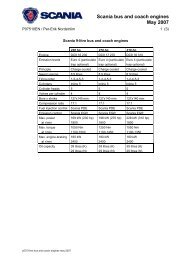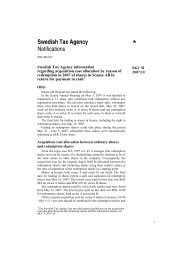Scania annual report 2003
Scania annual report 2003
Scania annual report 2003
Create successful ePaper yourself
Turn your PDF publications into a flip-book with our unique Google optimized e-Paper software.
TRENDS AND INDUSTRY DEVELOPMENTS<br />
Economic growth fuels demand for truck transport<br />
World production of heavy trucks<br />
rose by 10 percent to 590,000<br />
(540,000). <strong>Scania</strong> was the world’s<br />
fourth largest heavy truck make, with<br />
a market share of 7.8 (7.7) percent.<br />
Macroeconomic expansion and transport<br />
needs go hand in hand. Economic growth<br />
leads to higher consumption, which<br />
increases the need for transport services.<br />
In most markets today, only trucks can offer<br />
the flexibility and delivery assurance<br />
necessary to manage supply chains in the<br />
complex logistics systems that form the<br />
basis of our consumer societies.<br />
Operating cost and reliability<br />
In mature markets, large logistics companies<br />
compete on the basis of expertise<br />
and geographic reach. An overwhelming<br />
share of their transport services are contracted<br />
out, often to small haulage firms.<br />
To this large customer category, operating<br />
cost and reliability are decisive when<br />
choosing vehicles.<br />
A well-developed service and roadside<br />
assistance network are also important factors<br />
when every delivery must arrive on<br />
time.<br />
Because of the international structure<br />
of <strong>Scania</strong>’s sales, long before many competitors<br />
the company expanded and integrated<br />
its international sales and service<br />
network.<br />
About 40 percent of the world market for<br />
heavy trucks is found in <strong>Scania</strong>’s main<br />
market, Europe. During the past three<br />
decades, transport services in Europe<br />
have grown by an average of 12 percent<br />
each year. In the past decade, truck transport<br />
services have accounted for all of this<br />
increase. The European Union predicts<br />
that road transport volume will rise by 50<br />
percent between 1998 and 2010, but<br />
would like to limit this increase somewhat<br />
by stimulating rail and water transport.<br />
A number of EU countries are also<br />
planning to introduce kilometre-based<br />
road charges for heavy vehicles. The need<br />
for trucks will thus increase in Europe,<br />
while stricter road safety and environment<br />
performance standards are being imposed<br />
on vehicles.<br />
In emerging markets, demand for<br />
heavy trucks is determined both by GDP<br />
growth and infrastructure expansion.<br />
During the next decade, the total world<br />
market for heavy trucks is expected to<br />
grow to between 800,000 and 850,000<br />
vehicles.<br />
Intensive bus and coach competition<br />
World production of buses in <strong>Scania</strong>’s<br />
segment – city and intercity buses and<br />
tourist coaches – totalled 67,000 (63,000)<br />
units. One-third of these buses were sold<br />
in Europe. Latin America and Asia each<br />
accounted for about 20 percent of the<br />
world market.<br />
Public transport is being deregulated<br />
in a growing number of markets around<br />
the world. This opens the way for private<br />
operators. Competition is often very keen.<br />
The lowest possible operating cost and<br />
high bus availability often top the wish list<br />
of operators. This poses heavy demands<br />
on manufacturers’ service networks.<br />
Industrial and marine engines<br />
<strong>Scania</strong>’s deliveries of engines totalled<br />
3,165 (3,191) units. The trend in industrial<br />
and marine engines is towards increasingly<br />
complex products, driven among other<br />
things by new, tighter emission rules.<br />
Agreement paves the way for<br />
improved safety<br />
During <strong>2003</strong>, <strong>Scania</strong> signed an agreement with<br />
ExxonMobil making it the primary supplier of<br />
tanker trucks for the oil company’s markets in<br />
Europe, the Middle East, South East Asia, the<br />
Pacific region including Australia and New<br />
Zealand and Africa. <strong>Scania</strong>’s vehicles meet<br />
ExxonMobil’s high safety standards and will be<br />
used by transport companies that provide services<br />
to ExxonMobil in the above-mentioned<br />
regions.<br />
“This is an exceptionally prestigious contract.<br />
The fact that ExxonMobil has chosen<br />
<strong>Scania</strong> as a global partner demonstrates that<br />
<strong>Scania</strong>’s tanker truck concept meets the<br />
strictest safety standards worldwide,”<br />
comments Group Vice President Gunnar<br />
Rustad, Head of Sales and Services.<br />
<strong>Scania</strong> has earlier experience of working<br />
with ExxonMobil in various key markets in<br />
Europe. In Africa, the two companies also<br />
successfully implemented a project to provide<br />
tanker vehicles that meet European safety<br />
standards for transporting hazardous goods.<br />
This project was implemented in some of<br />
Africa’s most demanding and challenging environments<br />
in terms of terrain and road quality.<br />
The new agreement will enable <strong>Scania</strong> to<br />
further collaborate with ExxonMobil to continually<br />
improve tanker transport safety standards<br />
around the world.<br />
ANNUAL REPORT <strong>2003</strong> 34



